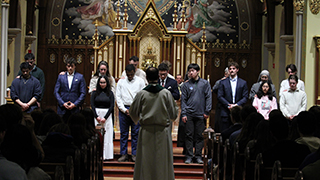The Olympics: No Fans or Families in the Stands? Nearly Half of Americans Say They’ll Still Be Watching - Seton Hall University
Thursday, June 3, 2021

Given the controversy, a gauge of the public pulse on the Olympics seemed in order. The Seton Hall Sports Poll found that among the general U.S. population, 52 percent agreed with the foreign citizen ban (30 percent oppose it), but only 33 percent agree with the family ban (48 percent oppose it).
Japanese Fans?
Asked if Japanese and Olympic officials should allow Japanese fan attendance in the
venues, 43 percent of the general population said yes, with 30 percent saying no.
Among sports fans and avid fans, it rises to 51 and 55 percent saying yes, and 28
and 30 percent saying no to Japanese fans in the stands.
The poll was conducted May 21-24 geographically spread across the United States using a national representative sample weighted according to gender, age, ethnicity, education, income and geography based on U.S. Census Bureau figures. The Poll had 1,554 adult respondents with a margin of error of +/- 3.2 percent.
Will a Fanless Stadium Make You Tune Out?
Asked if an absence of fans would deter them from watching the games on TV, 62 percent
of the general public said it would not, with 22 percent saying they were less likely
to watch without fans in the stands.
Did You Watch in 2016?
When the Games were held five years ago in Brazil, which allowed for much more live
coverage in the United States, 51 percent of the general population said they watched
at least some of the competition (more than just opening and closing ceremonies).
Among self described sports fans that number rose to 66 percent and to 74 percent
for avid fans.
Will You Watch This Year?
Although still two months away, nearly half of the general population (49 percent)
said they planned to watch some part of the Games. That number swells to 65 percent
among sports fans and 71 percent among avid fans. "No" to watching was only 38 percent
of the general population, 24 percent among sports fans and 21 percent among avid
fans.
No Fans = Less Exciting?
Fifty two percent said an absence of fans in the stands would not diminish the excitement
of watching the Games, though 32 percent said it would.
Not Live = Less Exciting?
Only 26 percent of the general population (but 36 percent of sports fans, 46 percent
of avid fans) said that the time delay from Japan, causing many events to be shown
on recorded delay, would diminish their excitement. Those who said it would not diminish
their excitement measured 58-52-44 percent (general population, sports fans, avid
fans).
Peek at Results in Real Time?
Asked if they planned on checking internet/social media in advance of watching the
delayed recordings events, 27 percent of the general population said yes, to 37 percent
of sports fans and 50 percent of avid fans.
"Knowing that the fans help to swell excitement, it will present a challenge to NBC to deal with the crowd factor in a way they never have before," said Marketing Professor and Poll Methodologist Daniel Ladik. "There will surely be a lot of camera time spent on cheering teammates."
Athletes Using Olympic Platform for Social Commentary
A majority of the general population – 53 percent – thought it was appropriate for
Olympic athletes to speak out on human rights issues in their own nation, a number
which rose to 56 percent among sports fans and 61 percent among avid fans. The numbers
opposing athletes speaking out were 28-27-25 percent respectively.
Speaking Out Against Other Nations?
When asked about athletes speaking out against perceived human rights issues in other
nations, the number approving dropped a bit, to 49 percent of the general population,
51 percent of sports fans and 58 percent of avid fans.
Speaking Out at the Olympics?
The number drops to 41 percent (general population), 45 percent (sports fans) and
54 percent (avid fans) when the question was: "Is it appropriate for Olympic athletes
to protest at the Olympics?" Forty-four percent of the general population said it
was not, and 43 percent of sports fans and 33 percent of avid fans agreed.
"The history of protest at the Olympics has not been one of accommodation, and this year will be no different," said Charles Grantham, director of the Center for Sport Management within Seton Hall's Stillman School of Business. "Although they won gold and silver in 1968, John Carlos and Tommie Smith were essentially 'canceled' from the Olympics for having the courage to stand in solidarity for human rights. The IOC has already said that they will punish athletes who protest at the 2021 Olympics – the American public is divided on this question in Japan, it will be interesting to see how this unfolds just seven months later for the Winter Olympics in China, a country with a record of human rights violations."
Baseball, Softball Are Back in the Games; Should Major Leaguers Have Been Allowed
In
This year marks a return of baseball and softball to the Olympic Games, and the U.S.
baseball roster will not include Major League players, as MLB will not pause its season
to allow them to compete. The public was divided on this question. Although fifty
percent of avid fans think MLB should have paused, the number drops to 38 percent
among sports fans and just 33 percent of the general population. Opposing such a shutdown
were 34 percent of the general public, and 39 percent of both sports fans and avid
fans.
About the Poll
The Seton Hall Sports Poll, conducted regularly since 2006, is performed by the Sharkey Institute within the Stillman School of Business. This poll was conducted online by YouGov Plc. using a national representative sample weighted according to gender, age, ethnicity, education, income and geography, based on U.S. Census Bureau figures. Respondents were selected from YouGov's opt-in panel to be representative of all U.S residents. This poll release conforms to the Standards of Disclosure of the National Council on Public Polls. The Seton Hall Sports Poll has been chosen for inclusion in iPoll by Cornell's Roper Center for Public Opinion Research and its findings have been published everywhere from USA Today, ESPN, The New York Times, Washington Post, AP, Reuters and McClatchey to CNBC, NPR, Yahoo Finance, Fox News and many points in between.
Categories: Athletics, Business, Nation and World, Research






